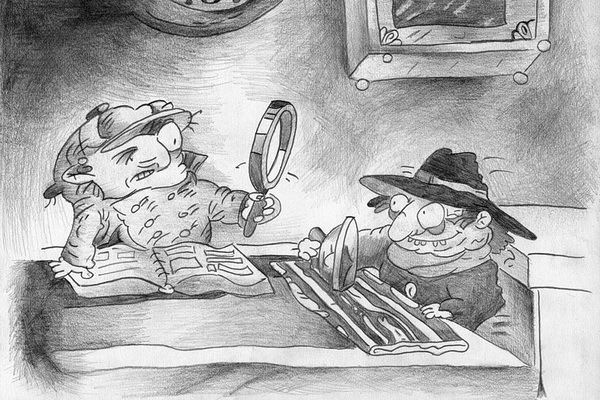Distinctive signs of "early" CIO
Which should pay attention, picking up the head of IT services

The position of CIO claims a large number of "early" managers who began to manage before they learned to do something with their own hands. Harm from such managers is usually more than good, and technicians feel the early maturity of managers a mile away. But companies whose business is not related to information technology regularly hire such candidates for their charisma.
In this article, I gathered the distinctive features of the “early” IT directors and tried to formulate them as accessible as possible. I hope that they will help non-IT experts and HR managers to filter candidates for the position of head of IT services. I would be glad if the Habrakhabr community will complement me or correct mistakes in judgments. But on this introductory part I finish and turn to the point:
')
1. Short (less than 2 years in one place) working hours

Information systems in companies have been introduced for 5 years or more. The ability to build information systems so that they do not have to be redone or written off ahead of time comes over the years when you see long-term consequences, or rather errors in decisions you once made. The specialists who work at each place for 1-2 years have no such experience, and at the position of CIO they replace the mistakes of their predecessors with their own mistakes, for which the company has to pay.
2. The abundance of "professional" slang in speech
If you do not understand what the candidate is talking about during the interview, when he becomes your CIO, the entire IT department will turn into a black box for you. You will either have to blindly accept the initiatives of the IT department, not trying to figure them out, or you will be regularly blamed for all sins, because "I told you that the xenes are weak in order to parse the task at such a speed." The ability to communicate in plain language is just as important a criterion for a CIO as competence.
3. Using "we" instead of "I" in a conversation

In general, I am impressed by leaders who do not appropriate the success of the department and, using them, use the pronoun “we”. But to tell at the interview which projects we have done and what results we have achieved is often a way to conceal that all the projects from the resume were successful in spite of, and not because of, the participation of the candidate in them. If at the interview the candidate stubbornly says “we” and cannot explain his role in the projects, then my advice to you is to stay away from him.
4. Versatile management experience
Professionals who care about who to manage — web developers, sysadmins, designers, or milkmaids — are called project managers, not CIOs. Such people do not understand the work of their subordinates and cannot adequately assess the resources for performing tasks. When making technical decisions, they are guided by the statements of manufacturers, and not by technical evaluation. As a result, your IT department will either work in a relaxed way, or heroically process, but in both cases, the solutions of those manufacturers who have the most unprincipled marketers will be implemented.
5. Ignoring resume writing rules

The task of the CIO is to help the company work and improve labor efficiency. But for this, the CIO must understand and understand the values of the work of all departments of the company. Resume with violation of well-known rules suggests that the candidate does not want to understand the work of personnel specialists, even when his fate depends on them. With such a CIO, it is likely that the company's employees will have to understand IT themselves, and not vice versa.
6. Errors and typographical errors in the text of the summary
The mountain of spelling errors and misprints in the text of the summary is either the candidate’s ignorance of the spelling checker, or excessive genius and the associated detachment from the realities of the world, or excessive nonsense and inattention. All three categories do not really tally with a person who must understand the technology, communicate with people and keep under control all aspects of the work of the unit entrusted to him. The summary of such a candidate can be safely sent to the furnace.
7. Inconsistency of presentation
When you have a couple of hundred users and computers, dozens of servers, without a structure, each question or problem requires a lot of time to solve. Professional deformation of system administrators - to structure everything. This, damn it, is laid on the subcortex and applies to everything without exception. If you received a resume, where everything is mixed up and sometimes repeats, then this is a summary of the level of a technical support specialist, and not a professional system administrator or, moreover, a IT director.
8. Absolute knowledge of all systems

A true professional knows his area of knowledge and area of ignorance. Only a novice specialist can know FreeBSD, Photoshop, Windows, Word, Active Directory, AutoCad, SQL and Delphi at the same time. As you gain experience, an understanding comes that each item requires years of honing the skill and the list of what you really know always decreases. But if you have a specialist with experience who claims to have absolute knowledge of everything, stay away from him. Such a leader is likely to bury all the best initiatives in your IT behind the wall of his incompetence.
9. Specifying specific equipment models in the resume
When a candidate submits specific hardware models to the summary (“set up the Cisco 851 and D-Link 1100”), you can be sure that he set up this particular equipment, and he does not understand the related technologies. Likewise, the person who changed the spark plug on the Stels Leader-50 scooter and added oil to the VAZ 2105 does not understand the engine. The only case where specifying specific models of equipment speaks positively about the candidate's experience is working with solutions that not every specialist in his life can even touch.
10. Lack of tangible business results in work

When a candidate cannot explain the benefits he has brought to the company at the last place of work or the benefits he formulates are not obvious to you, then you are a fan of playing IT (“update, configure, upgrade”), and not the CIO. If your general understands IT and is able to set and control the tasks of the IT service, you can ignore this criterion, but in other cases the CIO should drag the company forward, and not the company.
As an afterword:
There are no ideal candidates - there are poorly interviewed. But the absence of the aforementioned deficiencies of the candidate does not indicate his ideality, but only means that dialogue can be continued with him. My experience in certifying CIOs and studying the results of their work convinced me that as a CIO, there was more benefit from a specialist without any managerial experience at all, but without the disadvantages listed above, than from an experienced manager with shortcomings from the list. What do you think?
Ivan Kormachev
Company "IT Department"
www.depit.ru
Source: https://habr.com/ru/post/299394/
All Articles